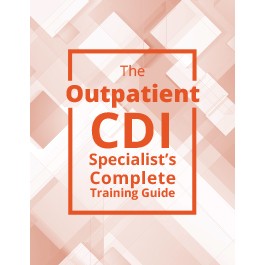Book excerpt: Outpatient query practice

Complete Training Guide
By Tracy Boldt, RN, BSN, CCDS, CDIP, and Ellen Jantzer, RN, MSN, CCDS, CCS, CRC
The rules of compliant query practice do not change based on the setting. We must consider query construction and wording of provider communication with the same eye for compliance as we have traditionally done in the inpatient setting. In 2018, ACDIS published a position paper, “Queries in Outpatient CDI: Developing a compliant, effective process,” outlining compliant query practices in the outpatient setting which those working in outpatient endeavors should review before transitioning to that role.
It states that because physician practice (and most other outpatient encounters) “move at a much faster pace than the inpatient arena…communication with providers must be timely and efficient.” Because of this concurrent record reviews can prove challenging for those working in outpatient settings. While retrospective reviews “allow for a review of a large number of records, this can burden the provider with multiple queries to answer.” So, the position paper states that “as a result, [physician practice] reviews are often performed prospectively, or prior to an encounter, to allow for providers to be queried before the patient has been seen (letting providers answer the query during the actual patient encounter).
Although some CDI specialists in the outpatient setting review the patient’s medical record prior to the patient’s visit, many find opportunities for query after the visit. Following the outpatient visit, and prior to claims submission, the CDI specialist should review all substantiated and documented conditions to confirm that they meet the requirements for a reportable diagnosis, the position paper states.
Regardless, the position paper states that “no matter the timing of the review—concurrent, retrospective, or prospective—or the nature of the query, CDI professionals must adopt compliant practices” and often refers back to previous query guidance developed by ACDIS and AHIMA.
One critical difference between inpatient and outpatient documentation and coding guidelines is the following guidance from Official Guidelines for Coding and Reporting, Section IV, on what constitutes a reportable diagnosis. In the outpatient setting, the terms “probable,” “suspected,” “rule out,” etc., do not apply. It states:
“The Uniform Hospital Discharge Data Set (UHDDS) definition of principal diagnosis does not apply to hospital-based outpatient services and provider-based office visits. Coding guidelines for inconclusive diagnoses (probable, suspected, rule out, etc.) were developed for inpatient reporting and do not apply to outpatients.”
The 2018 outpatient query position paper from ACDIS also addresses use of prior information from the medical record. “CDI specialists may encounter diagnoses within the problem list or history whose continued relevance is in doubt,” the paper states, leaving those working in physician practice and other outpatient programs with the dilemma of being able to search previous encounters for conditions that may have been lost in the paper shuffle of years past. While inpatient programs limit reviews essentially to the context and care being offered during that specific patient stay, the ACDIS paper states that CDI professions should review documentation from previous visits in order to advocate for patients and ensure continuity of care.
“If a patient has a history of diabetic neuropathy, retinopathy, and seizures, CDI specialists must ensure that future caregivers have this same specific information versus seeing a nonspecific ‘DM2’ written in the patient’s chart,” according to the paper.
However, lacking authoritative coding guidance from Coding Clinic, or the Official Guidelines for Coding and Reporting, or other sources, ACDIS recommends each facility develop its own policy on how far back it will review prior records and follow that policy in a consistent manner. Finally, ACDIS and AHIMA began work on a revision to the 2016 query practice brief in the summer of 2018 which most in the industry believe will likely address outpatient CDI efforts in some manner once it gets published, likely in the spring of 2019.
In conclusion, queries are a wonderful tool to obtain clarification as well as to educate physicians about documentation issues. As a CDI specialist, your responsibility is to ensure your query practices reflect both your organization query policies and directions outlined within industry best practices. Later in this book, we’ll review regulatory and compliance concerns related to noncompliant queries, and subsequent chapters further identify query opportunities and anatomy and physiology review by major diagnostic categories.
Editor’s note: This is an excerpt from The Outpatient CDI Specialist’s Complete Training Guide.
